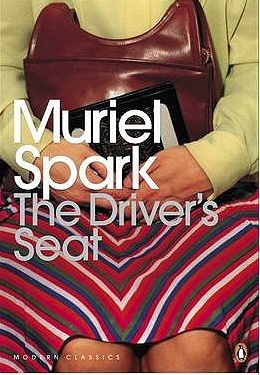
Muriel Spark is one of those authors that’s hit or miss for me. I liked the first two books I’ve read (pre-blogging) –Girls of Slender MeansandThe Prime of Miss Jean Brodie. Especially the first was a favorite the year I read it. The next one I picked wasTerritorial Rights– you can find my review here – and it was the first I really didn’t like. And now The Driver’s Seat is the second. I know it’s a favorite of many people, but I found it cold, sly, and just didn’t like the way it was told. Yes, it has amazing moments and I enjoyed some of the slyness but overall, it’s not my thing. That said, I can see why someone would like it, as it’s quite whacky and the writing is strong.
The book starts with Lise looking for the perfect dress. When she is told by a salesperson that the one she’s been trying on doesn’t stain because it’s made of a special fabric, Lise loses it completely. From that moment on the reader knows that something’s very wrong with Lise. Two pages after this intro we find this passage, and it’s an excellent example of Spark’s slyness – and cleverness.
Her lips are slightly parted: she, whose lips are usually pressed together with the daily disapprovals of the accountants’ office where she has worked continually, except for the months of illness, since she was eighteen, that is to say, for sixteen years and some months. Her lips, when she does not speak or eat, are normally pressed together like the ruled line of a balance sheet, marked straight with her old-fashioned lipstick, a final and judging mouth, a precision instrument.
As a reader we’re so fascinated by the description of Lise, that we might overread the little aside about her illness. We sympathize with someone who’s spent her youth at an office she clearly doesn’t like, doing a boring, tedious job. We also sympathize with her wish to organize the perfect holiday, down to the perfect holiday attire. But then we see her in action, see how she reacts to people, talks to people and how she chooses a garish outfit that will make her look like a cross between a striped lollipop and an old-fashioned prostitute. So clearly, the illness is very important and it’s easy to see what kind of illness that might have been.
From the beginning of the novel we know what will happen to Lise. We’re informed by the narrator who, at times stays a pure observer, but, then again, becomes omniscient and foreshadows or reveals the outcome of the book. Lise will get into trouble. She will be found murdered. This isn’t a spoiler, as it’s revealed early on. Just after the narrator has dropped that bomb on us, he/she retreats and describes his creature from outside.
I was keen to find out, what went wrong and how Lise got herself killed. The end is surprising and echoes that first passage I quoted above.
So, there’s humor here, there’s an oddly fascinating character who plays roles, speaks in many different accents, does a lot of very outlandish thing, and courts danger. So, you may wonder – what’s not to like?
It was the tone of the book. I’m usually fond of characters behaving so wildly. But I didn’t care for the way Spark described “her creature”, like a scientist who describes a butterfly he’s just spiked. At times it is humorous. We’ve all seen people behave strangely. Because they were drunk or because they were crazy or just eccentrics and that can be very entertaining. But watching them like this also lacks empathy. It’s unkind and cold. Territorial Rights had a similar tone, similar slyness. Those who love Spark will say, yes, but that tone is exactly the point. I’m sure it is, but it’s too cold for me. That said, I will read her again because she’s a clever writer and says a lot about many themes – gender relations, things that we’re topical at the time like macrobiotic food, the way society reacts when someone doesn’t fit in. And I like how she disobeys many of the writing rules that are usually taught in writing classes these days.
To do this book justice, which I feel, I might not have done, I leave you with two quotes that show how strong Sparks’ writing is. One quote is from a very humorous scene. The other one is one of those short things Lise says that reveal more than whole passages in other books.
The chandeliers of the Metropole, dispensing a vivid glow upon the just and unjust alike, disclose Bill the macrobiotic seated gloomily by a table near the entrance. He jumps up when Lise enters and falls upon her with a delight that impresses the whole lobby, and in such haste that a plastic bag he is clutching, insufficiently sealed, emits a small trail of wild rice in his progress towards her.
And here’s Lise. This is another “sly” quote as we suddenly get a look into Lise’s state of mind that’s more telling than most of what she does.
“It makes me sad”, she says. “I want to go home, I think. I want to go back home and feel all that lonely grief again. I miss it so much already.”
